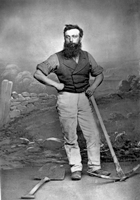Alexander Anderson Biography
Alexander Anderson (April 30, 1845 – July 11, 1909) was a Scottish poet.
Born in Kirkconnel, Dumfries and Galloway, Scotland, the sixth and youngest son of James Anderson a quarrier. When the boy was three, the household moved to Crocketford in Kirkcudbrightshire. He attended the local school where the teacher found him to be of average ability. The area around Croketford was renowned for martyrdom and Anderson seems to have taken inspiration from his walks in the hills in his later poetry. At sixteen he was back in his native village working in a quarry; some two years later (1862), he became a surfaceman or platelayer on the Glasgow and South-western railway, and generally wrote under the name of Surfaceman.
Spending all his leisure in self-culture, he mastered German, French, and Spanish sufficiently to read the chief masterpieces in these languages. His poetic vein, which was true if somewhat limited in range, soon manifested itself, and in 1870 he began to send verses to the ‘People's Friend’ of Dundee, and subsequently his fist book ‘A Song of Labour and other Poems’, was published in 1873 by the Dundee advertiser in a run of 1000. Thanks to the support of The Peoples Friend this issue sold out within a fortnight. He was also aided by the support of the Rev George Gilfillan, a poetry critic in Dundee. Gilfillan wrote to Thomas Aird “You will be greatly interested in his simple manner and appearance-an unspoiled Burns is these respects and not without a little real mens divinor. Of course you know his poetry and his remarkable history”. and there followed Two Angels (1875), Songs of the Rail (1878), and Ballads and Sonnets (1879). In the following year he was made assistant librarian in the University of Edinburgh, and after an interval as secretary to the Philosophical Institution there, he returned as Chief Librarian to the university. Thereafter he wrote little. Of a simple and gentle character, he made many friends, including the Duke of Argyll, Thomas Carlyle, and Lord Houghton.
A famous poem of his is "Cuddle Doon
A strappin', sonsie, weel-matched pair
Were Jock Macree an' Maggie Blair,
An' mony wusses, said an' thinkit,
They had that nicht when they were linkit.
...
The bairnies cuddle doon at nicht,
Wi' muckle faucht an' din—
'O, try and sleep, ye waukrife rogues,
Your faither's comin' in'—
...
One red rose you took from my hand—
O the light was sweet that summer day—
One red rose from her queenly band,
That was far too sweet to pine away.
...
The feeble infant, but an hour in life,
Lay wailing in our arms, while on the bed
Slept, like a faded flower, the one year's wife,
With all her mother's first sweet feelings, dead.
...
I heard beneath my feet the clear sharp ring
Of grinding rail and wheel,
I felt, as on we sped with rush and swing,
The carriage sway and reel.
...
